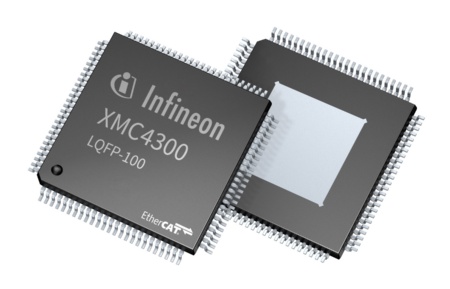EtherCAT® implementation complexity and cost can be reduced with the XMC4300microcontroller series of Infineon Technologies AG (FSE: IFX / OTCQX: IFNNY). Without compromise to EtherCAT communication features, the XMC4300 has been specifically developed for cost-sensitive industrial applications that also make high demands on design flexibility, connectivity and real-time performance. Target applications comprise factory automation, industrial motor control, I/O modules and robotics.The XMC4300builds on the XMC4800 series, which places special emphasis on communication and actuators and sensors.
“By adding the XMC4300 microcontroller series to the existing XMC4800, Infineon fosters the advancement of networked industrial automation and offers semiconductors for high-end and cost-sensitive EtherCAT automation devices,” said Martin Rostan, Executive Director of the EtherCAT Technology Group. “Surely the EtherCAT community will appreciate the greater ease of use with an integrated development environment tailored to EtherCAT applications.”
EtherCAT incomparably simple with XMC4300 and XMC4800
The XMC4300 and XMC4800 are the industry’s first microcontrollers with integrated EtherCAT node on an ARM® Cortex®-M processor with on-chip flash and analog/mixed signal capabilities. Both series enable compact designs because they require no additional components such as dedicated EtherCAT ASIC, external memory or a quartz clock generator to start up the EtherCAT slave controller. An integrated PLL supplies the EtherCAT IP with the necessary 25-MHz clock. Code is executed from the Cortex-M4 processor at 144MHz from the integrated RAM or flash memory.
The XMC4300 and the XMC4800 offer an elegant solution for implementation in mixed networks with CAN and EtherCAT. They allow a gateway from CAN to EtherCAT to be efficiently established through DMA transfers. The XMC4300 offers 256kB of Flash and 128kB of RAM memory. It features two CAN nodes with up to 64 message objects to be organized into send/receive FIFO. Hence, communication takes place largely without interaction with the CPU. The XMC4300 series is certified for an ambient temperature of up to 125 °C.
Availability of XMC4300 and XMC4800
The currently two devices of the XMC4300 series vary in temperature range, with up to 85 °C and up to 125 °C respectively. They are available in a LQFP-100 package and are pin and code compatible with those of the XMC4800 series.
For both, the XMC4300 and the XMC4800, volume production has already started. All XMC4300 and XMC4800 microcontrollers will be AEC Q100 qualified and therefore suited for commercial, construction and agricultural vehicles.
Plug & Play – Setting up EtherCAT with XMC4300
Infineon offers a development board, the XMC4300 Relax EtherCAT Kit, and suitable software development tools for immediate EtherCAT node setup. The XMC4300 Relax EtherCAT Kit is equipped with an XMC4300 and an on-board debugger, EtherCAT, CAN node and USB. As of February end, the kit is available from Infineon distributors or from the XMC Kit website(www.infineon.com/xmc-dev). For software development, Infineon offers the DAVE™ development environment with libraries for low-level drives and apps free of charge. For EtherCAT, DAVE uses SSC (Slave Stack Code) from Beckhoff. In addition to the free development environment, commercial EtherCAT slave stacks are on offer from established third-party manufacturers.
Further information
Further information about XMC4300 and XMC4800 with EtherCAT technology, the XMC microcontrollers and their development platform DAVE is available at www.infineon.com/ethercat and www.infineon.com/xmc and www.infineon.com/dave and www.infineon.com/xmc-dev.
For further information about EtherCAT technology please visit www.ethercat.org.
Infineon will be presenting its XMC novelties at the Embedded World Exhibition & Conference (February 23-24, 2016, in Nuremberg, Germany) in Hall 5, Stand 360. Please see www.infineon.com/embeddedworld.















